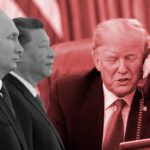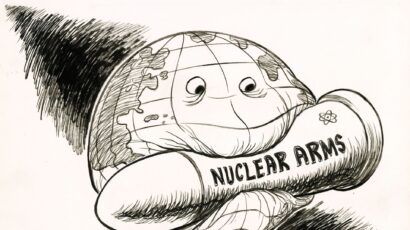Charting a smarter course for a US-Jordan nuclear deal
By Jonathan Pearl | October 25, 2010
If the Obama administration wants to set a new, strengthened standard for nuclear cooperation agreements, it must take a counterintuitive decision: relax demands that Jordan forgo uranium enrichment in order to secure a nuclear partnership with Washington.
In December 2009, the United States finalized a nuclear deal with the United Arab Emirates (UAE) that has come to be seen by many in Washington as the “gold standard” on which other agreements should be modeled. In that deal, the UAE pledged to forgo uranium enrichment and plutonium reprocessing on its own soil in exchange for nuclear assistance. By volunteering to abstain from the pursuit of sensitive nuclear facilities, the UAE not only demonstrated its commitment to nonproliferation and lack of interest in nuclear weapons, but also secured a powerful ally for its nuclear energy plans.
But Washington cannot expect every country to make this sacrifice for a US partnership. Jordan, for example, has been in nuclear talks with Washington since the two states signed a memorandum of understanding on nuclear cooperation in 2007, and it has become clear that Amman is unwilling to follow the UAE’s singular example. If Washington wants to avoid potentially driving Amman to seek political and economic support elsewhere, the Obama administration should settle its internal disputes and relax its demand that Amman relinquish its right to enrich uranium in order to secure an energy deal with the United States.
Few details of the ongoing US-Jordan negotiations have been revealed, but Amman’s position is understandable. Jordan is energy poor — it depends on foreign suppliers for 96 percent of its energy needs — as well as water poor. Nuclear energy would help Jordan reduce its energy dependence and would generate power for desalination plants to provide water for its people and crops. Furthermore, Jordan recently discovered that its territory holds the world’s 11th largest deposits of uranium. Little wonder, then, that Amman is reluctant to give up its right to enrich and reprocess nuclear fuel.
The UAE precedent — an unrealistic standard. The acquisition of sensitive nuclear fuel cycle technology, such as enrichment and reprocessing facilities, gives states the ability to make weapon-grade fuel for nuclear bombs. Obtaining weapon-grade fuel is the most challenging step for a state that seeks nuclear weapons, hence Washington’s desire to limit the number of states with such capabilities. (Iran’s interest in centrifuge enrichment is a testament to the concern such technology can generate.) The UAE’s decision to forgo the pursuit of sensitive nuclear facilities was a remarkable gesture of nonproliferation commitment, but expecting other countries to adhere to similar terms is unrealistic.
There are three practical problems with the UAE agreement. First, there is no guarantee — and little reason to believe — that any other nuclear energy aspirant will be willing to accept the same terms that the UAE agreed to. Indeed, although the Obama administration has called the UAE deal the “gold standard” of cooperation agreements, there are already clear indications that not all potential US partners will be held to it. As Assistant Secretary of State for Public Affairs P.J. Crowley said in August, “We recognize and we certainly would encourage countries to make the same decision that the UAE has made. At the same time, not every country is going to make that decision.”
Second, other than the United States, no nuclear supplier states currently appear willing to insist on such strict terms with potential partners; nuclear-related contracts, after all, can be worth billions. Jordan already has signed nuclear cooperation deals with nine other states — China, Russia, and Japan among them — none of which has insisted on enrichment and reprocessing prohibitions. Exporters’ lack of enthusiasm for stringent measures is also illustrated by the deadlock in the Nuclear Suppliers Group (NSG) over whether and how to tighten fuel cycle controls.
Finally, US attempts to force other suppliers to pursue UAE-style deals could backfire. The United States would have some leverage over suppliers who are close allies, such as France, Japan, and South Korea. Yet exercising that influence would be unwise; even if such efforts were successful, they are unlikely to change Jordan’s nuclear energy trajectory. They could, however, anger and alienate Amman, a key US ally, and potentially push it to find other partners on projects beyond energy issues. Such an outcome could have negative repercussions for a range of US foreign policy priorities in the Middle East, from the peace process to the situations in Syria and Iraq.
Similarly, taking a hardline approach with Jordan and insisting that it set aside its rights (under the 1968 Nuclear Non-Proliferation Treaty) in order to receive an energy deal from Washington would lend weight to the claims of Iran’s leaders and other hostile elements that Washington is biased against Muslim states and that it seeks to thwart economic development in the Middle East.
An ideal partner in the Middle East. The United States should find ways to make the deal with Jordan work. After all, Amman has a long history of cooperation in the realm of nonproliferation. It has even signed and ratified the Additional Protocol — an agreement controversial in many non-nuclear weapon states because it grants broad access to International Atomic Energy Agency (IAEA) inspectors. And, recently, Amman’s responsible behavior won it a place on the IAEA’s influential Board of Governors.
In addition, unlike some other potential entrants into the nuclear energy club, Jordan’s needs are real and immediate. Amman suffers from persistent energy shortfalls and a dearth of freshwater resources, hampering its opportunities for development. Nuclear power may not be a panacea, but it would go a long way toward powering Jordan’s economic development and providing potable water.
While Jordan needs nuclear energy in the near term, it is unlikely to pursue any enrichment in the next 20 years — a point explicitly stated by Kamal Khdier, director of planning at Jordan’s Atomic Energy Commission, in September. Although Khdier did not elaborate, the likely reasons are straightforward: Small-scale enrichment facilities would bring more political risk than gain for Amman, and large-scale commercial uranium enrichment is of questionable economic benefit. (A look at the credit ratings of major enrichment providers such as Areva, Urenco, and the United States Enrichment Corporation, as well as the cost overruns that plague construction of new centrifuge plants, highlights the tenuous economic benefits associated with commercial enrichment.)
Given that Jordan is unlikely to acquiesce to Washington over the issue of enrichment, the Obama administration would do well to find a way around the issue and reach a deal. If policy makers in Washington are to succeed in their quest to tighten controls over proliferation-sensitive fuel cycle activities, it will be necessary to chart a creative course — one with prospects for wide acceptance among both nuclear energy aspirants and suppliers. And negotiations with Jordan provide an opportunity to do this; Washington could hardly ask for a better partner.
Together, we make the world safer.
The Bulletin elevates expert voices above the noise. But as an independent nonprofit organization, our operations depend on the support of readers like you. Help us continue to deliver quality journalism that holds leaders accountable. Your support of our work at any level is important. In return, we promise our coverage will be understandable, influential, vigilant, solution-oriented, and fair-minded. Together we can make a difference.
Topics: Opinion















